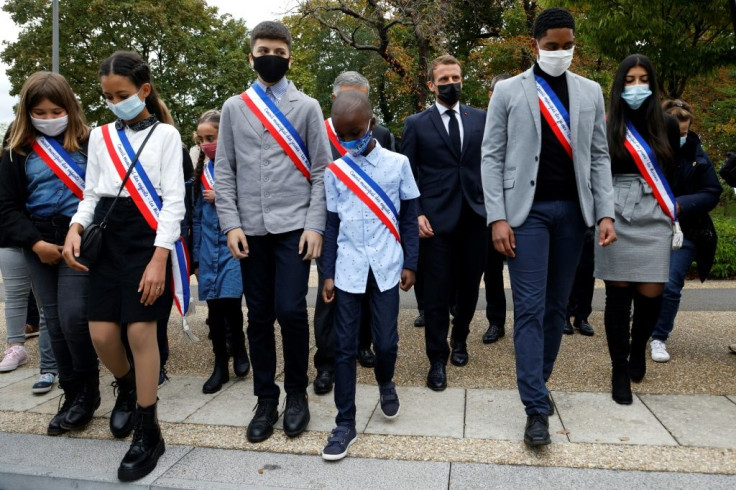Macron Unveils Plan To Fight Radical Islam In France
President Emmanuel Macron unveiled a plan Friday to defend France's secular values against radical Islam, announcing stricter oversight of schooling and better control over foreign funding of mosques.
Describing Islam as a religion "in crisis" worldwide, Macron insisted that "no concessions" would be made in a new drive to eradicate extremist religious teaching in schools and mosques.
At the same time, Macron said France must do more to offer economic and social mobility to immigrant communities, adding radicals had often filled the vacuum.
His long-awaited address came 18 months before presidential elections where Macron is set to face a challenge from the right, as public concern grows over security in France.
"Islam is a religion that is in crisis all over the world today, we are not just seeing this in our country," Macron said in Les Mureaux, a town outside Paris with a historically large immigrant population.
He said extremists were seeking to indoctrinate new converts across the country, which has one of the largest Muslim populations in Europe.
He denounced a trend of "Islamist separatism" that flouts French rules and seeks to create a "counter-society" holding its own laws above all others.
This form of sectarianism often translates into children being kept out of school, and the use of sporting, cultural and other community activities as a "pretext to teach principles that do not conform to the laws of the republic," Macron said.
He said the government would present a bill in December that would strengthen the country's bedrock 1905 law that officially separated church and state.
Among the new law's provisions, there will be closer scrutiny of the curriculum at private schools and stricter limits on home-schooling for reasons other than a child's health problems.
Community associations that receive state subsidies will have to sign a contract avowing their commitment to secularism and the values of France.
There will be closer scrutiny of such organisations, and the law will make it easier to shutter those breaking anti-indoctrination rules.
The new measures will also include a ban on the wearing of religious symbols for employees of subcontractors providing public services, such as transport operators.

The rule already applies to public servants.
Macron said there had been increased reports of abuses by sub-contracting staff, including bus drivers refusing women entry for wearing clothing considered too revealing.
He emphasised that it was necessary to "liberate Islam in France from foreign influences," naming countries such as Saudi Arabia, Qatar and Turkey.
To this end, the government will step up checks on foreign financing of mosques and clamp down on letting imams go abroad for training, or on hosting foreign preachers on French soil.
Macron stressed that the measures did not seek to stigmatise or alienate France's Muslims but to bolster "our ability to live together."
He urged better understanding of Islam and said the problem of radicalisation was partly a product of the "ghettoisation" of French cities and towns where "we constructed our own separatism."
"We have concentrated populations based on their origins, we have not sufficiently created diversity, or ensured economic and social mobility" in segregated areas, he said.
Radical Islamists have swooped in, taking advantage of "our withdrawal, our cowardice," he added.
France has in recent years been forced to take a hard look at its core republican values, perceived by many to be threatened by Islam in the wake of several terror attacks since 2015 targeting secular liberties such as freedom of expression.
Macron was speaking one week after a man wounded two people with a meat cleaver outside the former Paris offices of the Charlie Hebdo satirical weekly, which the government denounced as "Islamist terrorism."
Staff at Charlie Hebdo were massacred in January 2015 by Islamist gunmen seeking to avenge its publication of caricatures of the Prophet Mohammed.
In January, a renewed debate about freedom of expression erupted when a teenager received death threats for attacking Islam in an expletive-laden Instagram rant.
And earlier this month, divisions were highlighted when MPs walked out when a university student entered parliament in a headscarf.
© Copyright AFP 2024. All rights reserved.











